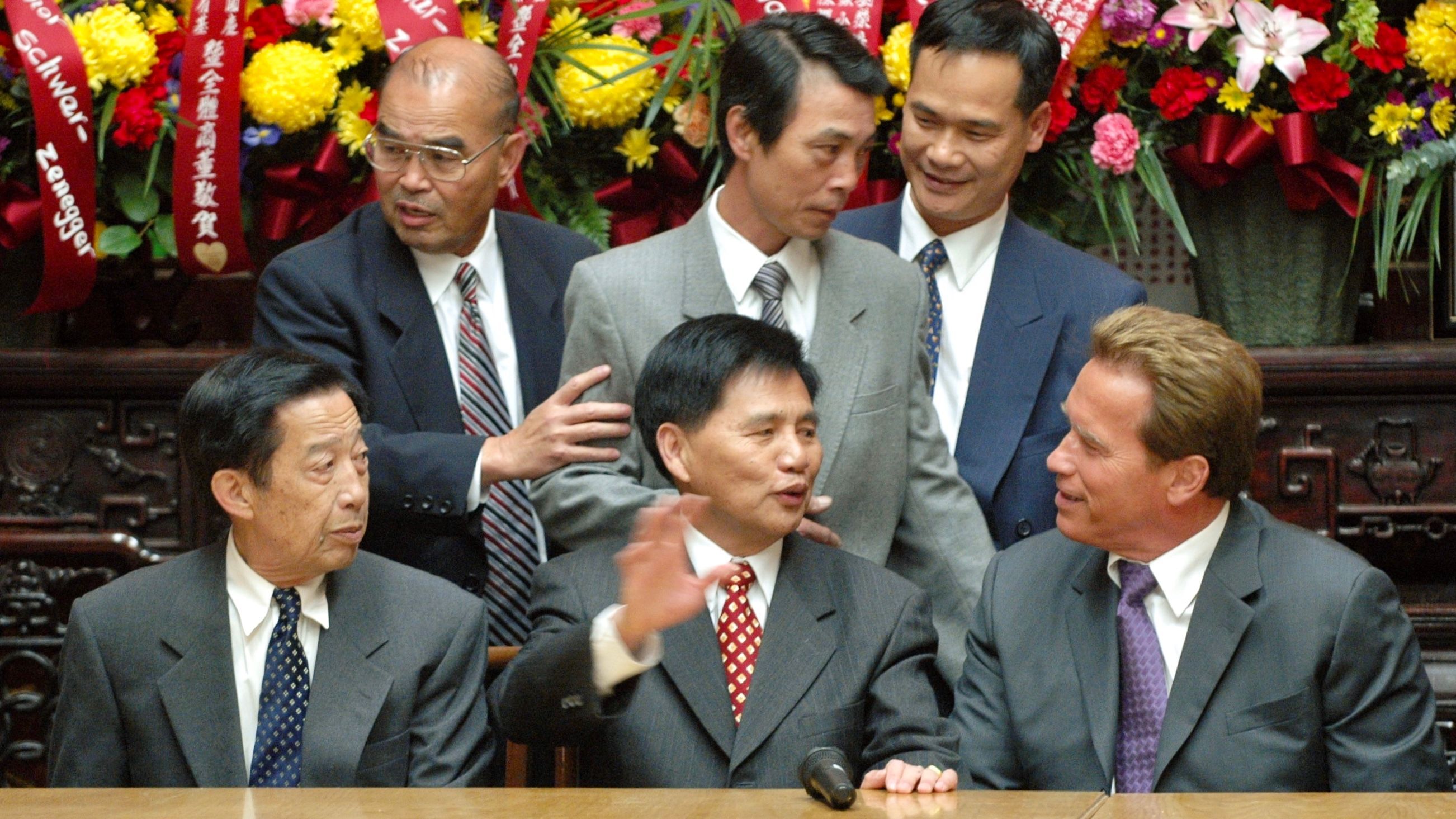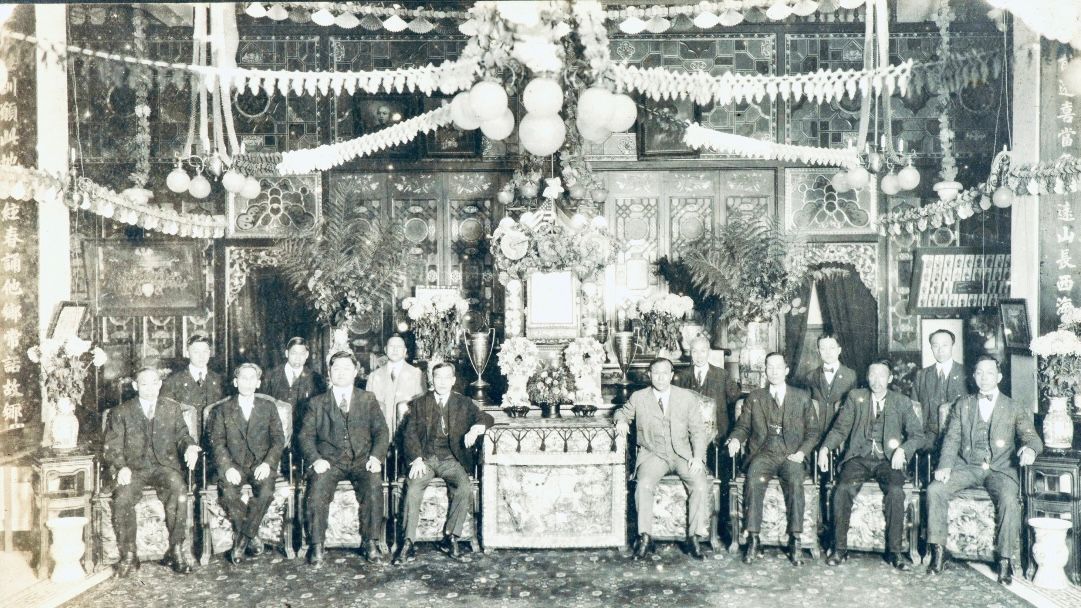Chinese Consolidated Benevolent Association (CCBA) celebrates its 175th anniversary on October 5, 2024


SAN FRANCISCO — The Chinese Consolidated Benevolent Association (CCBA), the oldest and most powerful Chinatown family association in San Francisco formed in 1849, will celebrate its 175th birthday on October 5, 2024.
The long standing CCBA in recent decades has extended its role from a civil rights organization fighting for equal opportunities for the Chinese community to providing a platform for many government officials and political candidates to present their ideas of public policies and running for public offices.
The 175th anniversary celebration will be held at the Far East Cafe in Chinatown on October 5 with a presentation on the profound history and contribution of the CCBA. The event is open for the public to join and celebrate.
The CCBA headquarters building is located at 843 Stockton Street in San Francisco Chinatown. In late 19th to early 20th centuries, similar family organizations were formed across the United States and Canada at the metro cities where a large number of Chinese immigrants were settled down after coming from China, like New York City, Seattle, Chicago, Los Angeles, Boston, Detroit, Oakland, Sacramento, Vancouver and more.
The CCBA in San Francisco was the first one to be formed among them.
In the 1800s during the gold rush era, an influx of Chinese immigrants came to San Francisco and California looking for work opportunities and the discovery of gold. When the gold industry declined, Chinese immigrants found other opportunities to make a living, like fishing, farming, and railroad building.
San Francisco has been a main entry point and hub for Chinese economic, social, and cultural activities since the first group of Chinese immigrants arrived in the 1800s.
According to the Chinese Six Companies, a book authored by William Hoy in 2012, the first official Chinese immigrants arrived in California in 1849. By the end of that year, 791 Chinese had settled in California, and this number grew to 4,025 in 1850 and 12,000 in 1851.
When Chinese immigrants settled down in San Francisco during the gold rush, they found that the government did not protect their interests. A number of family associations were formed starting 1849 to protect and support one another based on their villages, districts, cities or provinces in China where they originated from.
Among the family associations between themselves, they coordinated and worked together to fight for their common interests. Six organizations eventually joined the consolidated association becoming the Six Companies before the CCBA was named and established in 1882 which was also the same year that the Chinese Exclusion Act was passed by Congress and signed into law by President Chester A. Arthur. This act restricted Chinese immigration to the United States for 10 years.
About 12,000 Chinese immigrants from China, primarily from the Guangdong Province, came to the United States to build the western section of the transcontinental railroad between 1865 to 1869, according to the U.S. Department of Labor.
"Their efforts, which connected the western United States to the eastern United States, laid the foundation for the extraordinary economic prosperity enjoyed by the United States in the years that followed," the U.S. Department of Labor recognized the Chinese railroad workers for its Hall of Honor at the D.C. headquarters in 2014.
"Many of these workers risked their lives and perished during the harsh winters and dangerous working conditions. They faced prejudice, low wages and social isolation," the U.S. Department of Labor wrote about the contribution of Chinese railroad workers at the Hall of Honor. "Despite these challenges, they courageously took a stand to organize for fairer wages and safer working conditions. Their efforts not only bridged our nation together, they advanced the cause of good, safe jobs for all workers, immigrant and native workers alike."
San Francisco also became a destination for the Chinese railroad workers that increased the need to form a broader organization to fight for their equal rights in the United States. CCBA fulfilled the role as the head of family associations in San Francisco Chinatown to advocate for the best interests of the Chinese community.
The CCBA is composed of seven member associations, Sam Yup, Yeong Wo, Kong Chow, Hoy Sun Ning Yung, Hop Wo, Yan Wo and Sue Hing. Sue Hing became the 7th association to join CCBA. The CCBA was also called the “Six Companies” prior to Sue Hing joining.
Sam Yup Benevolent Association was formed in 1851, Kong Chow 1851, Yeong Wo 1852, Hoy Sun Ning Yung 1853, Yan Wo 1953, Hop Wo 1862, and Sue Hing 1878.
In the meantime, smaller family and business associations were formed in San Francisco Chinatown. The CCBA not only served as a leading organization, it also mediated the conflicts and disagreements between associations in Chinatown. It is estimated that over 200 family associations, based on last names and original hometowns in China, are still headquartered in San Francisco Chinatown today.
"The founding of the first Chinese organization in San Francisco Chinatown is disputed. Him Mark Lai noted that by 1849, Chinese merchants in the city had formed a gongsi, or company, to maintain order and facilitate interactions with the broader community, although its exact name remains unknown," said Doug Chan, an attorney and former Board Chair of the Chinese Historical Society of America headquartered in San Francisco.
"Hoy, however, points to the Kong Chow Association as the first true organization, established in 1851, while other sources suggest it was founded in 1849," said Chan who is a 4th generation San Franciscan and his great grandfather was born in San Francisco in 1867.
"The importance of a consolidated organization became more evident after the Chinese Exclusion Act of 1882, which triggered widespread anti-Chinese sentiment. Encouraged by Chinese Consul General Huang Tsun-hsien, the six district associations—Kong Chow, Hoy Sun Ning Yung, Sam Yup, Yeong Wo, Hop Wo, and Yan Wo—united to form a broader association in November 1882," said Chan. "It became officially incorporated as the Chinese Consolidated Benevolent Association (CCBA) in 1901.”

"Over the years, the number of district associations fluctuated, but the name Chinese Six Companies persisted. By the 1890s, the association included eight district groups. The CCBA has played a significant role in advocating for Chinese rights and assisting Chinese communities globally, including efforts to fight anti-Chinese legislation and providing support during discriminatory events in Latin America," Chan applauded the contribution of CCBA since it was formed.
"Before 1911, the CCBA supported the policies of the Manchu emperor, but after the establishment of the Republic of China in 1912, it backed the new government’s efforts to abolish unequal treaties and combat anti-Chinese legislation," Chan added. "Merchants have traditionally led the CCBA, supporting free enterprise and representing the Chinese community in local and national politics."
"The CCBA has also contributed to community welfare, establishing schools, hospitals, and night watch services in Chinatown. It acts as a representative voice for the Chinese community, although some members of the community have since distanced themselves from it," Chan said.
The CCBA has not been only an organization to bring all Chinatown associations together, they also served as a civil rights group for the entire Chinese community. A long list of landmark lawsuits originated from the plaintiffs who sought help from the CCBA.
"History has told us that the CCBA would hire the best lawyers to fight in courts for the Chinese community's equal rights and equal opportunities. It ended up with many landmark court rulings that benefited everyone beyond the Chinese community. We have been very proud of the CCBA," said Robert Chiang, President of the Yan Wo Benevolent Association.
One of the very famous landmark court rulings brought by the CCBA was the United States v Wong Kim Ark in 1898. The U.S. Supreme Court ruled in 1898 for the appeal case of United States v. Wong Kim Ark that all people born in the United States are citizens, regardless of their race or the nationality of their parents. This ruling established the principle of birthright citizenship.
Wong Kim Ark was born in San Francisco Chinatown in 1873. He left San Francisco for China to visit his parents on November 15, 1894 at age 21. When he returned in August 1895, he was detained and denied entry by the U.S. Customs claimed the Chinese Exclusion Act.
Wong Kim Ark gained support from the CCBA to hire lawyers to sue the U.S. government. He fought his case all the way to the Supreme Court and won his birthright citizenship on March 28, 1898. The ruling became a landmark decision to benefit Chinese Americans and all ethnicities for over a century.
John Trasvina, a human rights attorney and former dean of the University of San Francisco School of Law, had organized events in 2023 to celebrate the 125th anniversary of the U.S. v Wong Kim Ark ruling.
"In the 1890s, there were no Chinese American lawyers. CCBA found attorneys and made it possible for Wong Kim Ark to take the defense of his rights and dignity as a U.S. citizen all the way to the Supreme Court," Trasvina congratulated the 175th anniversary of CCBA.
"Wong Kim Ark's 1898 Supreme Court victory upheld birthright citizenship in the U.S. Constitution - all persons born here are U.S. citizens. People from all backgrounds now benefit from this victory to keep people born here from being excluded from America," Trasvina said. "The Wong Kim Ark case is an important part of CCBA's legacy for Chinese Americans and members of all communities."
Yick Wo v Hopkins was another landmark ruling by the U.S. Supreme Court in 1886. The Supreme Court ruled in favor of the Yick Wo Laundry in San Francisco Chinatown on the equal protection clause which banned any discrimination against people on the basis of race in how laws were written and enforced.
In 1880, the city of San Francisco passed a health and safety ordinance which required all laundries in wooden buildings to get the approval from the Board of Supervisors in order to obtain a license. At the time, about 95 percent of the city’s 320 laundries were located in wooden buildings. And approximately two-thirds of those laundries were owned by people of Chinese descent.
The laundry license law didn’t seem to single out the Chinese owners in its language. But when it was applied, every Chinese laundry owner in San Francisco was denied a permit. Every white-owned laundry was granted a permit.
Lee Yick, the owner of Yick Wo Laundry, had operated a laundry business in a wooden building for more than two decades. Yick refused to shut down his business and was arrested by the San Francisco Sheriff's Department. He fought his case from behind bars suing Sheriff Peter Hopkins, who served in 1885-1886, and took it all the way to the Supreme Court.
"The Supreme Court determined that the ordinance was unconstitutional under the 14th Amendment’s 'equal protection' clause – because of the unequal application of the law. It was the very first Supreme Court case to use this standard – and it did so almost 80 years before the Court’s landmark rulings striking down Jim Crow statutes enacted in the segregationist South," stated the Constitution Project which produces educational documentaries and film series exploring the U.S. Constitution and the stories behind the rulings.
"Yick Wo and the Equal Protection Clause tells the story of an unlikely Constitutional hero and the extraordinary impact his case has had on how we view our Constitutional protections today," noted the Constitution Project which had produced a film on the ruling of Yick Wo v. Hopkins.
As more Chinese Americans who grew up in the United States enrolling in law schools and more Asian civil rights and legal organizations established locally and nationally, the CCBA has extended its role during the past several decades to working more closely with the government agencies and providing a platform for the government officials and political candidates to connect with the Chinese community.
175 years later today, the CCBA still stands very firm and strong to be the oldest and most powerful organization in San Francisco Chinatown.
All San Francisco mayors in the last 50 years have frequently visited the CCBA to share their views and policies with the Chinese community. The CCBA has also served as a significant and crucial bridge between the government agencies and the Chinese community in San Francisco.
- New leadership at 137-year-old Chinese school explores ways to inspire more students to learn Chinese in San Francisco Chinatown
- In a 52-2 vote, Chinese American Democratic Club endorses to recall Supervisor Engardio as a result of passage of Proposition K
- An amnesty program in San Francisco is back through July 1, 2025 to legalize existing awnings
- Opinion: Political betrayal warrants recall
- Do empty yellow loading zones best serve the San Francisco Chinatown community?
- T&T Supermarket, largest Asian grocery chain in Canada, announces to open at San Francisco City Center on Geary Blvd. in winter 2026
- (Breaking news: Charlene Wang wins in the Oakland's special election) Charlene Wang runs for Oakland District 2 Councilmember on April 15, 2025 to represent Oakland Chinatown
- Mayor Lurie announces plans to support small businesses including First Year Free program waiving fees for new businesses



